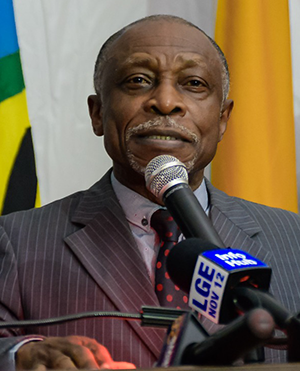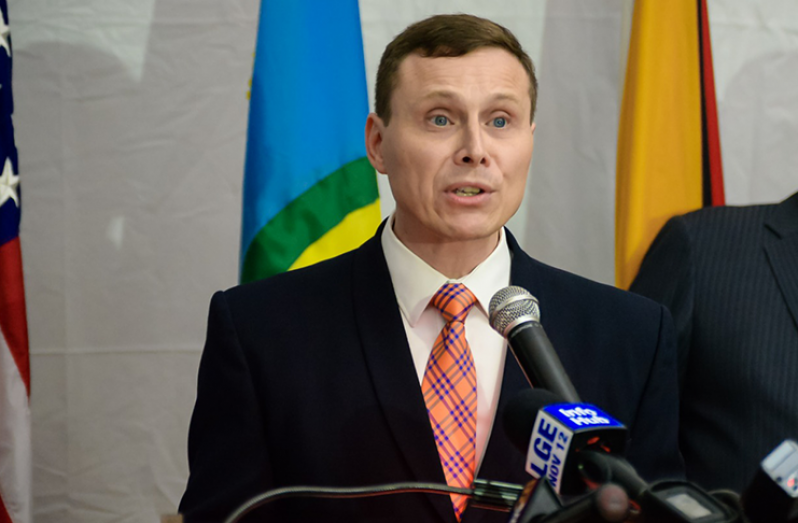— US urges Guyana and Venezuela
THE US has called on both Guyana and Venezuelia to respect the 1899 Arbitral Award on the ongoing border controversy between the two nations.
Early this year, the US had called for a timely resolution to the controversy. Deputy Chief of Mission of the US Embassy in Guyana, Terry Steers-Gonzalez said outgoing US Ambassador Perry Holloway had motivated the US to adopt its current position.

“Ambassador Holloway logged this win before he arrived here in September 2015… this was done while he waited in Washington for confirmation by the US Senate,” said Steers-Gonzalez at a farewell ceremony for Holloway on Friday.
Foreign Affairs Minister Carl Greenidge, who also spoke at the reception, described the US’s position on the border controversy as significant.
“It is an extremely strong and significant statement,” said the minister, adding that it was the Treaty of Washington in 1897 which led to the 1899 Arbitral Award.
The border controversy arose after Venezuela contended that the Arbitral Award of 1899, which settled the country’s border, was null and void.
In an effort to bring an end to this age-old controversy, on January 30, 2018, United Nations (UN) Secretary-General António Guterres, in keeping with the 1966 Geneva Agreement, announced that the International Court of Justice (ICJ) would be the next means to be used for resolution of the controversy.
On March 29, 2018, Foreign Affairs Minister Carl Greenidge filed Guyana’s application with the ICJ but Venezuela has declined to participate in the court action filed by Guyana.
“The Venezuelan delegation has informed the president of the court, through a letter signed by the President of the Republic, Nicolás Maduro Moros, of its sovereign decision not to participate in the procedure that Guyana intends to initiate, since the court manifestly lacks jurisdiction over an action unilaterally proposed by the neighbouring country, which does not have the consent of Venezuela,” a communiqué issued by the People’s Power Ministry for Foreign Affairs said after meeting with ICJ’s Abdulqawi Ahmed Yusuf.
Nonetheless, the Government of Guyana has reportedly submitted its memorial to the ICJ in keeping with an order dated June 19, 2018. The ICJ had fixed November 19, 2018 and April 18, 2019 as the respective time-limits for the filing of a Memorial by the Co-operative Republic of Guyana and a Counter-Memorial by the Bolivarian Republic of Venezuela respectively although the latter objected.
While on the international stage during the 73rd Regular Session of the UN General Assembly (UNGA 73), Minister Greenidge told world leaders that there was still time for Venezuela to participate at the level of the ICJ to resolve the age-old Guyana/Venezuela Border Controversy.
Under Article 53 of the Statute of the Court, “whenever one of the parties does not appear before the court, or fails to defend its case, the other party may call upon the court to decide in favour of its claim.” The vice president said Guyana firmly believes that adherence to the cardinal principles of the sovereign equality of States, respect for the sovereignty and territorial integrity of States, and the peaceful resolution of disputes are the most effective guarantees of peace.
“As a responsible member of the global community, Guyana seeks peace not only in our Region, but throughout the world where the scourge of war and conflict are an obstacle to development. They divert attention away from the pressing problems of development and the enhancement of human well-being,” Vice President Greenidge had said.
But though Guyana has moved to the ICJ to resolve the age old controversy, it has long called for the 1899 Arbitral Award to be respected.
Since 1962, Venezuela has been contending that the 1899 Arbitral Award, which had given more than 90 per cent of an area to then British Guiana (now Guyana), is null and void, although it had originally accepted the award. The final judgment handed down by the ICJ will bring an end to this long-standing territorial controversy, and Guyana is well equipped to prove that the award remains valid.
The Facts
The Guyana/Venezuela Border controversy started during the second half of the 19th century between Venezuela and Great Britain over the location of the border between its colony of British Guiana and the Spanish-speaking country.
This continued until an Arbitral Tribunal was empanelled in 1897 to determine the borders and issued an Arbitral Award on October 3, 1899.
Following this, a joint commission with representatives from both countries delineated the borders in 1905. For half a century Venezuela honoured this agreement in word and deed.
In 1931, a boundary commission made up of representatives from Great Britain, Venezuela and Brazil agreed on the specific point on Mount Roraima where the boundaries of British Guiana, Venezuela and Brazil meet. A concrete marker was erected soon after. The matter was permanently settled.
Venezuela’s Minister of Foreign Affairs, Esteban Gil Borges in 1941 agreed that the frontier with British Guiana was well defined and was a closed issue.
However, in 1962, Venezuela unilaterally and without any basis or evidence announced that it regarded the Award of 1899 as null and void.
By November 1965 a meeting in London between Venezuelan and British representatives and a representative from British Guiana was held. A joint Communique stating that both sides should work to “find satisfactory solutions for a practical settlement of the controversy which has arisen as a result of the Venezuelan contention,” was issued.
In February of 1966, the governments of British Guiana, Great Britain and Venezuela, in Geneva, Switzerland, signed an agreement by which a bilateral commission was appointed to seek “satisfactory solutions for the practical settlement of the controversy between Venezuela and the United Kingdom, which has arisen as the result of Venezuela’s contention that the arbitral award of 1899 about the frontier between British Guiana and Venezuela is null and void.”
A mixed commission was established out of the Geneva Agreement. However, from the beginning, Venezuela ignored the main role of the agreement under which the commission was established to deal with Venezuela’s contention of nullity in the 1899 award.
That mixed commission was unable to fulfil its mandate largely because Venezuela declined to deal with the question of its contention of the nullity of the 1899 Award.
The Geneva Agreement does not state or imply that there is a territorial controversy between the countries or that there is a matter where the border between the two countries is unsettled. What it recognises and seeks to resolve is Venezuela’s contention that the Award of 1899 is null and void.
Venezuela, however, has worked feverishly over the years at turning the controversy about its contention of invalidity of the arbitral award into a dispute about territory.




.png)









